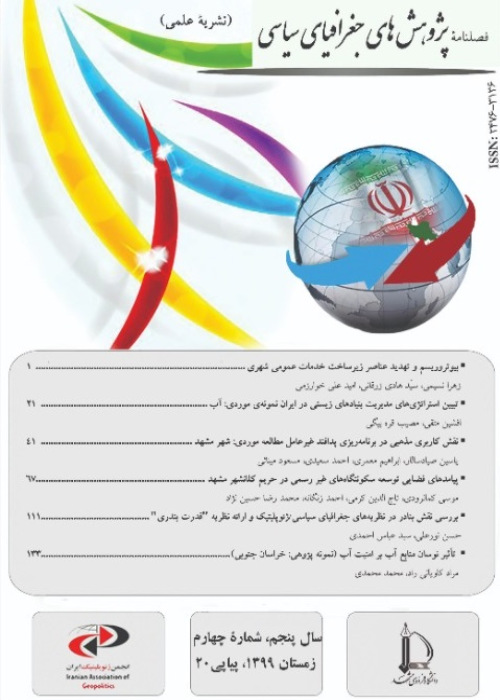A Study of Regionalism and Convergence Challenges in the Gulf Cooperation Council
Regionalism has attended an important mechanism for regional development in Europe from the second half of the 20th century and spread rapidly to other parts of the world. The Persian Gulf is a distinct and unique region among the various regions of Asia and Southwest Asia. This region consists of eight countries, including Iran, Iraq, Saudi Arabia, the United Arab Emirates, Kuwait, Bahrain, Qatar and Oman. Generally, there is the best context to make regionalism and regional convergence. The history of the idea of regionalism in the Persian Gulf dates back to the 1970s. A new political and security space was created in the region of Persian Gulf when the British colonial power left it in 1971. The coastal countries of Persian Gulf tried to play a greater role in the post-British region and maintain regional stability. Accordingly, in this decade, Iran, Iraq, Saudi Arabia, Kuwait, and Oman, all, have proposed regionalization and convergence in whole or in part of the Persian Gulf region to shape new security arrangements.The Islamic Revolution of Iran took place at the end of 1970s. Saudi Arabia with the newly independent Gulf States found the Islamic revolution as a clear threat to the survival and existence of their government and the security. Saudi Arabia's rulers pay attention to regionalism after the Islamic Revolution and with the onset of the Iran-Iraq war. They noticed to regionalism to counter the Iranian revolution and the balance of power with Iran and Iraq. Heads of the Arabian Peninsula countries established the Gulf Cooperation Council in May 1981. Gulf Cooperation Council has comprised six countries, including Saudi Arabia, UAE, Kuwait, Bahrain, Qatar, and Oman.Despite 37 years have passed since the establishment of the Gulf Cooperation Council, the heads of the member states have drafted different constitutions and regulations for reaching the unions and regional unions. They’ve encountered major challenges to achieve regionalism and unification. Hence, the question is that what challenges the countries of the Cooperation Council face in the context of regionalism and unification and why these six countries on the southern coast of the Persian Gulf did not succeed to achieve full regionalism and regional unity?
The purpose of this study is to explore the challenges and obstacles the Gulf Cooperation Council countries have faced in regionalism and regional unification. The research hypothesis is that "the Gulf Cooperation Council is in the process of regionalization and regionalization has done, but it faces fundamental political, security and economic challenges in order to evolve regionalism and regional unification, and therefore cannot be a successful model to provide the regionalism". This research has been done in descriptive and analytic method with historical approach. The required data have been collected in a library and documentary way.
The Gulf Cooperation Council, although having political and security gains for its member states and being able to continue its activities for almost four decades, it is still at the beginning of the process and is far from convergent regional alliance. The Cooperation Council has encountered many challenges and difficulties, which can be analyzed in three dimensions of political, security and economic:The political challenges of the Cooperation Council are deep-rooted and many of them are resulted from geopolitical crises, not easily resolvable. The countries of the Cooperation Council have created regionalization, but have not yet entered a regionalism and regional unification. They face a regional identity crisis in regionalism process. So, the regionalization of the Cooperation Council has taken place in the part of the Persian Gulf region and in a "sub-region", namely, in the countries of the southern coast of the Persian Gulf. The countries of the Cooperation Council do not have the same view on different regional and international issues, and each of them has a different perspective on regional issues of geopolitical interest and bilateral relations with regional countries such as Iraq and Iran, and countries outside the region and the global powers.Except for Saudi Arabia, other members of the Cooperation Council lack the strategic depth and cannot defend their territorial integrity in regional and international wars, due to their small size. The weak strategic depth of the Persian Gulf's small States has placed it under the Saudi Arabia's security umbrella. Saudi Arabia is a country that is vulnerable to security.Economically, the Cooperation Council countries are not a good complement to each other and cannot improve the economic needs of each other. In other words, all member states of the Cooperation Council, with the exception of the oil product, are consumers and import countries. For this reason, the trade relations between the members of the Cooperation Council members are very limited.
The Cooperation Council faces some challenges. The most important challenges are political, identity, security, and economic ones. In the political sector, countries involved political inequalities, territorial and border disputes, tribal structures, and the crisis of legitimacy. From the standpoint of identity, the Cooperation Council is formed in part of the Persian Gulf region, and it is a sub-region with a flawed identity that functions in a contradictory manner in the larger Gulf region. In the security dimension, it is weak and fragile and faces serious threats. In the economic sector, the member states are not a good complement to each other, and have not been prepared to form an economic alliance due to political and identity and security barriers.
- حق عضویت دریافتی صرف حمایت از نشریات عضو و نگهداری، تکمیل و توسعه مگیران میشود.
- پرداخت حق اشتراک و دانلود مقالات اجازه بازنشر آن در سایر رسانههای چاپی و دیجیتال را به کاربر نمیدهد.



